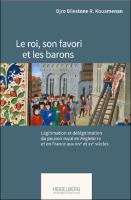Le roi, son favori et les baronset XVe siècles
Single-Blind-Peer-Review overseen by Series Editor
Légitimation et délégitimation du pouvoir royal en Angleterre et en France aux XIVe
Author(s)
Bilestone, Djro
Kouamenan, R.
Collection
AG UniversitätsverlageLanguage
FrenchAbstract
At the end of the Western Middle Ages, the new notions of the legitimacy of royal power and its exercise were made more visible by the presence of royal favourites whose figure should be reconsidered. The present study links the reproach of sexual misconduct as a political argument in medieval discourse to medieval ideas about royalty and government, opening new perspectives of a cultural history of politics in the Later Middle Ages. Die politische Rolle des Favoriten und die Art seiner Beziehung zum König sind in der Forschung oft nicht klar gesehen worden, da in den Diskursen des frühen und späten Mittelalters die besondere Nähe zum Herrscher regelmäßig in der Sprache der Liebe und in Gesten der körperlichen Nähe und Intimität zum Ausdruck kam. So entstand der Eindruck, dass der König aus homosexueller Neigung seinem Günstling übermäßigen Einfluss gewährte – auf Kosten der Barone, die ebenfalls einen Anteil an der Macht beanspruchten. In dieser Studie wird die Figur des Favoriten neu betrachtet und in ihrer Bedeutung über den Einzelfall hinaus verständlich gemacht. Sie setzt den Vorwurf sexuellen Fehlverhaltens als politisches Argument in Bezug zur Entwicklung der Vorstellung von Königtum und Herrschaft und eröffnet so neue Perspektiven einer Kulturgeschichte des Politischen im Spätmittelalter. Dans la recherche, le rôle politique du favori et la nature de sa relation avec le roi ont souvent été obscurcis par le fait que, dans les discours du haut et du bas Moyen Âge, la proximité particulière avec le souverain était régulièrement exprimée dans le langage de l’amour et dans des gestes de proximité physique et d’intimité. Ainsi, l’impression est née que le roi, par inclination homosexuelle, accordait une influence excessive à son favori – aux dépens des barons, qui revendiquaient, eux aussi, une part du pouvoir. Dans l’esprit d’une »histoire culturelle de la politique«, le présent ouvrage reconsidère la figure du favori, la rend compréhensible et tangible dans sa signification au-delà du cas individuel. Il met en évidence le caractère constructif des modèles modernes de perception du désir sexuel et souligne l’importance de l’inconduite sexuelle comme argument politique dans le discours médiéval.
Keywords
Favourite; Royal Power; Legitimation; Political History; History of sexualities; Favori; Pouvoir royal; Légitimation; Histoire politique; Histoire des sexualitésDOI
10.17885/heiup.834ISBN
9783968220857, 9783968220864, 9783968220857Publisher
Heidelberg University Publishing (heiUP)Publisher website
https://heiup.uni-heidelberg.de/Publication date and place
Heidelberg, 2021Series
Pariser Historische Studien, 123Classification
History and Archaeology
CE period up to c 1500


 Download
Download Web Shop
Web Shop